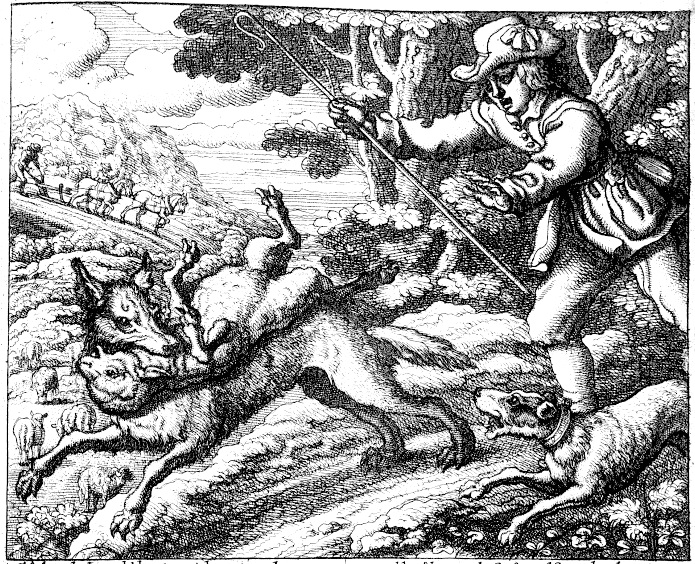The Boy Who Cried Wolf on:
[Wikipedia]
[Google]
[Amazon]
 The Boy Who Cried Wolf is one of
The Boy Who Cried Wolf is one of
"Crying wolf: The increasing fatigue around false alarms"
''Security101'', 22 Sept, 2021
book illustrations of the fable
{{DEFAULTSORT:Boy Who Cried Wolf, The Aesop's Fables English-language idioms Fictional shepherds Fictional wolves Wolves in folklore, religion and mythology Big Bad Wolf ATU 1200-1349
 The Boy Who Cried Wolf is one of
The Boy Who Cried Wolf is one of Aesop's Fables
Aesop's Fables, or the Aesopica, is a collection of fables credited to Aesop, a Slavery in ancient Greece, slave and storyteller who lived in ancient Greece between 620 and 564 Before the Common Era, BCE. Of varied and unclear origins, the stor ...
, numbered 210 in the Perry Index. From it is derived the English idiom "to cry wolf", defined as "to give a false alarm" in ''Brewer's Dictionary of Phrase and Fable'' and glossed by the ''Oxford English Dictionary'' as meaning to make false claims, with the result that subsequent true claims are disbelieved.
Fable
The tale concerns a shepherd boy who repeatedly fools villagers into thinking a wolf is attacking his town's flock. When an actual wolf appears and the boy calls for help, the villagers believe that it is another false alarm, and the sheep are eaten by the wolf. In a later English-language poetic version of the fable, the wolf also eats the boy. This happens in ''Fables for '' (1830) by John Hookham Frere, in William Ellery Leonard's ''Aesop & Hyssop'' (1912), and in Louis Untermeyer's 1965 poem. The moral stated at the end of the Greek version is, "this shows how liars are rewarded: even if they tell the truth, no one believes them". It echoes a statement attributed toAristotle
Aristotle (; 384–322 BC) was an Ancient Greek philosophy, Ancient Greek philosopher and polymath. His writings cover a broad range of subjects spanning the natural sciences, philosophy, linguistics, economics, politics, psychology, a ...
by Diogenes Laërtius
Diogenes Laërtius ( ; , ; ) was a biographer of the Greek philosophers. Little is definitively known about his life, but his surviving book ''Lives and Opinions of Eminent Philosophers'' is a principal source for the history of ancient Greek ph ...
in his ''The Lives and Opinions of Eminent Philosophers'', in which the sage was asked what those who tell lies gain by it and he answered "that when they speak truth they are not believed". William Caxton
William Caxton () was an English merchant, diplomat and writer. He is thought to be the first person to introduce a printing press into Kingdom of England, England in 1476, and as a Printer (publishing), printer to be the first English retailer ...
similarly closes his version with the remark that "".
History
The story dates from Classical times, but, since it was recorded only in Greek and not translated into Latin until the 15th century, it only began to gain currency after it appeared in Heinrich Steinhöwel's collection of the fables and so spread through the rest of Europe. For this reason, there was no agreed title for the story. Caxton titles it "" (1484), Hieronymus Osius "The boy who lied" ("", 1574), Francis Barlow "Of the herd boy and the farmers" ("", 1687), Roger L'Estrange "A boy and false alarms" (1692), and George Fyler Townsend "The shepherd boy and the wolf" (1867). It was under the final title that Edward Hughes set it as the first of ten ''Songs from Aesop's Fables'' for children's voices and piano, in a poetic version by Peter Westmore (1965). It also features as the second of "Aesop's Fables for narrator and band" (1999) by Scott Watson (b. 1964) Teachers have used the fable as a cautionary tale about telling the truth, but an educational experiment in the first decade of the 21st century suggested that reading "The Boy Who Cried Wolf" increased children's likelihood of lying; reading about George Washington and the cherry tree, however, decreased this likelihood dramatically. The suggestibility and favourable outcome of the behaviour described, therefore, seems the key to moral instruction of the young. However, when dealing with the moral behaviour of adults, Samuel Croxall asks, referencing political alarmism, "when we are alarmed with imaginary dangers in respect of the public, till the cry grows quite stale and threadbare, how can it be expected we should know when to guard ourselves against real ones?" Recent reports in a number of disciplines have linked the idiom derived from the fable, "crying wolf", with the phenomenon now described as "alert" or "alarm fatigue
Alarm fatigue or alert fatigue describes how busy workers (in the case of health care, clinicians) become desensitized to safety alerts, and as a result ignore or fail to respond appropriately to such warnings. Alarm fatigue occurs in many field ...
", the state referred to by Croxall above.Monica Gonzalez"Crying wolf: The increasing fatigue around false alarms"
''Security101'', 22 Sept, 2021
References
External links
* * * Laura Gibbs' gallery of 15th–20th centurbook illustrations of the fable
{{DEFAULTSORT:Boy Who Cried Wolf, The Aesop's Fables English-language idioms Fictional shepherds Fictional wolves Wolves in folklore, religion and mythology Big Bad Wolf ATU 1200-1349